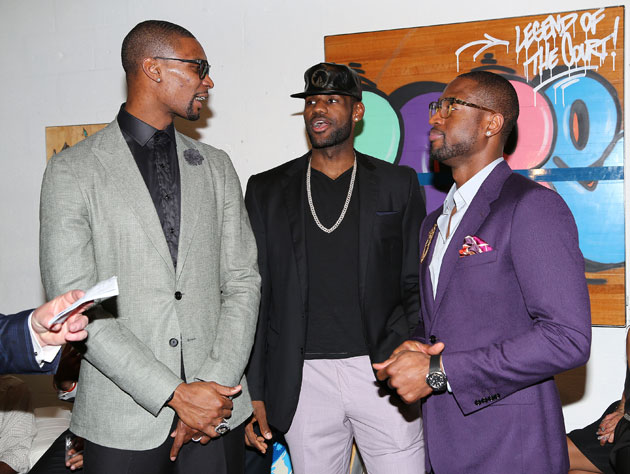
The Miami Heat may be this year's defending champions and top pick to take the title next June, but they're paying the cost to be the Bosh boss. Even with only four players making more than the league's average salary this year, the Heat will shell out over $84 million in salaries for 2012-13, vaulting deep into the luxury tax territory it has paid since putting together elaborate and celebrated sign-and-trade and re-signing machinations to secure the rights to LeBron James, Chris Bosh, and Dwyane Wade in 2010.
As a result of the 2011 lockout, in 2014 the NBA will amplify its already painful luxury tax penalties by instituting a "repeater tax," sent at teams that have paid the tax in four out of five seasons, and the Heat are almost certain to pay it should the team either continue with its salary structure for 2014-15, or re-sign their top three players after exercises an early-termination option on the contracts.
The possibilities feel just about endless. All manner of options await the Heat as they work through the luxury (HA!) of possibly winning two more titles before having to make some significant sacrifices. Sports Illustrated's Ian Thomsen came through with the breakdown last week:
As a repeat taxpayer, the Heat will be facing the highest incremental tax rates in NBA history. If, for example, the luxury-tax threshold is established at $75 million -- a highly optimistic gain of roughly $5 million from this season -- the Heat could be faced with a tax bill approaching $48 million. In total, they would be paying $141.3 million for 12 players.
"They're going to have to break up their team,'' predicted a rival general manager who has done the math.
Unless the NBA's financial circumstances improve over the next couple of years, Arison will be faced with two unhappy choices: The Heat could run a big deficit in 2014-15 to pursue the championship, or he could break up their winning roster by way of trades, amnesty or by not re-signing James, Wade or Bosh, should they exercise their options to become free agents in 2014.
If league revenues were to jump higher than expected over the next two years, the tax threshold would be raised accordingly and Arison might be able to find a way to escape with his team intact. But the NBA's TV contracts with ESPN/ABC and TNT don't expire until 2016, and league executives don't foresee major financial gains rescuing the NBA before the repeater tax takes effect.
Of course, unlike teams such as the Raptors or Bulls that could cut significant salary from their payroll but using the amnesty clause on players signed prior to 2011 (like Carlos Boozer or Andrea Bargnani), the Heat don't have a player making that sort of scratch on their roster. Mike Miller has a player option of $6.6 million for that year, but that's just above the average salary. If the Heat re-signed either Bosh or Wade in 2014, the team then wouldn't be allowed to use the clause on their contracts.
It's a year and a half away, to be sure, but this is significant stuff. We could see a dynasty broken up after three consecutive championships, and for reasons we can understand even if owner Micky Arison is independently wealthy (and sometimes, kind of a jerk about it) and the Heat have taken in two months worth of playoff revenue for four straight seasons by then. As Thomsen points out, the team is right on the cusp of being able to afford a payroll in the mid-$100 millions once the tax sets in, but it's an iffy proposition. Miami may be listed as a "big market" team by fans unhappy with choices made by several superstars over the last few years, but the fact remains that Miami is very much a mid-market basketball town, well short of Los Angeles or New York.
Then the options hit.
Scarily, LeBron James will be in his prime in 2014, and possibly coming off a three-peat as NBA champion. He has the option to opt-out of his contract for an even larger one, or waive his early-termination option for 2014-15 and pick up his player option for the next season for a combined $42.7 million.
Or, with Wade fading and teams clearing space elsewhere, he could jump again. To, say, Los Angeles and a team potentially working with Dwight Howard and Steve Nash in 2014-15. A team that would have to renounce the rights to Kobe Bryant — the newest Mr. Laker — in order to clear the cap space for James. And while this may feel cold or cruel, should Bryant want to play past his current contract, understand that Kobe very much entertained offers to play with the Clippers or Bulls in 2004 after the Lakers dealt Shaquille O'Neal to appease him, and demanded a trade prior to the 2007-08 season.
 Despite James' brilliance, Dwyane Wade is Mr. Heat; but he's struggling through a tough year in 2012-13 and his production has declined precipitously. It's not fair to expect this to be a sign of things to come, even if Dwyane turns 31 in a month, but if this style of play continues Wade certainly won't be worth the nearly $36 million he's set to make this year and next. Declining to re-sign Dwyane in 2014 should he opt-out would seem to be the obvious, if tough, answer; but what if Wade doesn't opt-out? What if he chooses to waive his early termination option and pick up his player option and make the $42 million he's owed from 2014 to 2016?
Despite James' brilliance, Dwyane Wade is Mr. Heat; but he's struggling through a tough year in 2012-13 and his production has declined precipitously. It's not fair to expect this to be a sign of things to come, even if Dwyane turns 31 in a month, but if this style of play continues Wade certainly won't be worth the nearly $36 million he's set to make this year and next. Declining to re-sign Dwyane in 2014 should he opt-out would seem to be the obvious, if tough, answer; but what if Wade doesn't opt-out? What if he chooses to waive his early termination option and pick up his player option and make the $42 million he's owed from 2014 to 2016?
If this sort of play continues, that could be a nightmare scenario for Miami — even as much as they adore and respect their two-time champion. Wade took less money to stick with the Heat and give James the biggest contract of the trio in 2010, and he might want another cosmic payoff down the line.
Of course, if the finances are too dire, the Heat could do the unimaginable. They could use the amnesty clause on Dwyane Wade. They could waive Dwyane Wade, if he chooses to stick around in 2014 and 2015. He'd still get paid, of course, but he'd be off the team that drafted him in 2003. Off a team that, again, he may have won four rings with at that point.
Such are the finances in the new NBA, salary cap rules that were put in place to keep players in the same town for ages but instead might encourage endless team-switching, waivings, trades, and worry. The Heat are still trying to figure out how to defend their first championship, and yet it's a perfectly reasonable thing to wonder about some 19 months before the tax implications hit. It's going to be fascinating to watch it all play out.
No comments:
Post a Comment